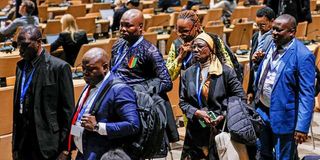COP29 delivers key deal for international carbon markets

Delegates leave a hall after listening to statements from various speakers at the United Nations climate change conference COP29, in Baku, Azerbaijan November 19, 2024.
What you need to know:
- A significant achievement at COP29 was the resolution of Article 6 of the Paris Agreement, which governs international carbon trading mechanisms.
The recently concluded COP29 in Baku, Azerbaijan, marked a pivotal moment in the global climate agenda by finalising the last unresolved aspect of the Paris Agreement after nearly a decade of negotiations.
The conference, dubbed the "Finance COP," culminated in a commitment from developed nations to mobilise $300 billion annually for developing countries by 2035.
This new climate finance goal, the New Collective Quantified Goal (NCQG), signifies a shift from the previously demanded $1.3 trillion per year, redistributing the responsibility for achieving climate targets beyond developed countries to include private investments and alternative funding sources.
Discussions at COP29 revealed deep divisions among nations regarding climate finance. While developed countries agreed to contribute $300 billion, many critics argued that this amount is inadequate for effective climate action. Developing nations, particularly small island states and least developed countries, expressed dissatisfaction, claiming that the proposed financial support does not meet their urgent needs.
A significant achievement at COP29 was the resolution of Article 6 of the Paris Agreement, which governs international carbon trading mechanisms. This article has been contentious since the agreement's inception in 2015. Delegates applauded the successful conclusion of discussions surrounding Article 6, branding it a long-awaited resolution that many believe will facilitate substantial progress toward global climate goals, particularly in limiting warming to 1.5 degrees Celsius.
Understanding Article 6 is essential for grasping its implications for global climate policy. It includes several key components aimed at fostering international cooperation in climate action. Article 6.2 enables bilateral trading of carbon credits, allowing countries to purchase credits from those that exceed their emission reduction targets.
Article 6.4 establishes a UN-backed mechanism for broader carbon market operations, facilitating large-scale trading while ensuring environmental integrity through rigorous standards and oversight. Article 6.8 promotes non-market cooperation among countries to enhance climate action without relying solely on market mechanisms.
The journey to finalise Article 6 faced numerous challenges, including political divides and technical disagreements that stalled progress over the years. The initial discussions were fraught with contention as nations grappled with the implications of carbon trading and its potential global impact on emissions reduction efforts.
COP29 commenced positively with an agreement on standards under Article 6.4, laying the groundwork for a centralised carbon market managed by the UN. However, debates persisted over Article 6.2's implementation details and potential impact on emissions trading systems across different nations.
Article 6's resolution is expected to yield significant benefits for global climate action by establishing a robust carbon market that facilitates international cooperation among countries in achieving their Nationally Determined Contributions (NDCs). This framework promotes economic efficiency and environmental integrity.
One primary advantage of the new carbon market under Article 6 is its potential to enhance economic efficiency in achieving net-zero targets. By allowing countries to trade carbon credits, Article 6 enables nations to meet their emissions reduction commitments more cost-effectively.
Research suggests that cooperative implementation using Article 6 could reduce resources required for emissions reductions by up to $250 billion annually by 2030 compared to independent NDC implementations. The collaborative nature of Article 6 also has the potential to increase global climate ambition significantly.
If savings from this collaborative approach are reinvested into further climate initiatives, emissions mitigation efforts could nearly double, allowing countries to significantly reduce greenhouse gas emissions without incurring additional costs.
Particularly beneficial for developing countries, Article 6 facilitates financial flows from developed nations to support climate action and sustainable development initiatives. The agreement anticipates that these financial transfers could exceed $1 trillion annually by 2050 due to rising global carbon prices and increased investment in carbon markets.
Despite these promising aspects, experts caution that significant work remains to ensure the effectiveness of Article 6's implementation. Critics have highlighted accountability risks associated with carbon trading frameworks lacking a central authority overseeing these markets.
Concerns persist about the integrity of carbon markets established under Article 6. Without stringent oversight, there is potential for dubious projects that could harm marginalised communities or lead to double counting of emissions reductions.
Dr Lamfu Yengong from Greenpeace Africa expressed strong reservations about the outcomes of COP29: "The carbon market mechanisms agreed in Baku are nothing but a neo-colonial scheme dressed up as climate action.We refuse to let Africa's natural heritage become a cheap offset playground for polluters from the Global North."
He emphasised that real climate action must prioritise keeping fossil fuels in the ground rather than creating new markets for pollution permits.
Similarly, Mohamed Adow, director of Power Shift Africa, criticised the resolution: "We will remember Baku for enabling rich polluters to cheat their way out of actual emission reductions through dubious pollution permit markets." He warned that this outcome creates a system that is too complex and reliant on external stakeholders to ensure high-integrity actions.
In contrast, leaders at COP29 hailed the resolution of Article 6 as a crucial step forward in combating climate change. COP29 President Mukhtar Babayev stated: "This is a critical tool for keeping 1.5 degrees in reach. Climate change is a transnational challenge, and Article 6 will enable transnational solutions." Yalchin Rafiyev, COP29 lead negotiator, added. "The implementation has unlocked one of the most complex challenges in climate diplomacy... Article 6 means coal plants decommissioned, wind farms built, and forests planted, a wave of investment in the developing world."
Ali Mohamed, Special Climate Envoy for Kenya and chairperson of Group African Negotiators, remarked on the importance of safeguards. "We hope the safeguards in these decisions will ensure environmental integrity... The African Group remains confident that the decision made regarding Article 6.8 of the Glasgow Committee on Non-Market Approaches will enable the implementation of concrete projects and programmes on the ground.





